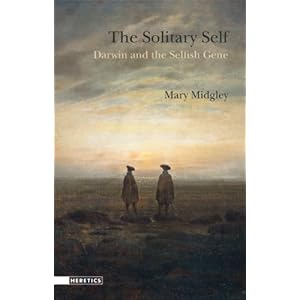 This comes from FORA.tv and the RSA - an excellent and entertaining talk by English philosopher Mary Midgley on her recent book The Solitary Self. Here si the book description from Amazon:
This comes from FORA.tv and the RSA - an excellent and entertaining talk by English philosopher Mary Midgley on her recent book The Solitary Self. Here si the book description from Amazon:Renowned philosopher Mary Midgley explores the nature of our moral constitution to challenge the view that reduces human motivation to self-interest. Midgley argues cogently and convincingly that simple, one-sided accounts of human motives, such as the 'selfish gene' tendency in recent neo-Darwinian thought, may be illuminating but are always unrealistic. Such neatness, she shows, cannot be imposed on human psychology. She returns to Darwin's original writings to show how the reductive individualism which is now presented as Darwinism does not derive from Darwin but from a wider, Hobbesian tradition in Enlightenment thinking. She reveals the selfish gene hypothesis as a cultural accretion that is just not seen in nature. Heroic independence is not a realistic aim for Homo sapiens. We are, as Darwin saw, earthly organisms, framed to interact constantly with one another and with the complex ecosystems of which we are a tiny part. For us, bonds are not just restraints but also lifelines.She is on the right path in my opinion - we have been so infatuated with individualism and self-interest that we have created isolation and existential loneliness rather that individuation (in the Jungian sense). We need community, we need interpersonal connection - AND we need healthy healthy individual identity - both/and, not either/or.
Description
Britain's leading moral philosopher, Mary Midgley, visits the RSA to challenge the idea that we are self-directed individuals at the mercy of our "selfish genes."
Midgley is one of the most renowned moral philosophers of her generation and the author of many books, including Beast and Man, Wickedness and The Myths We Live By. Her memoir, The Owl of Minerva was published in 2005.
Tags:
No comments:
Post a Comment